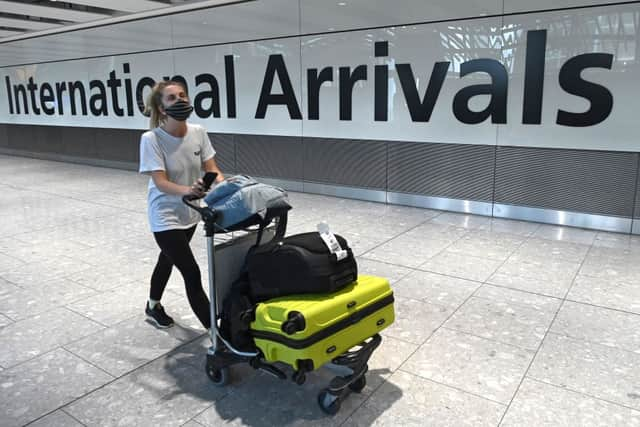Covid: new Omicron travel rules explained - will travellers have to take a test before arriving in England?
This article contains affiliate links. We may earn a small commission on items purchased through this article, but that does not affect our editorial judgement.
and live on Freeview channel 276
Travellers will have to take a pre-departure test before arriving in England from today (7 December) as part of new rules designed to slow the spread of the Omicron variant.
Health Secretary Sajid Javid has warned that the new Covid variant was now spreading within communities and not just linked to international travel.
Advertisement
Hide AdAdvertisement
Hide AdScientists have also warned that Omicron will be the dominant variant in the UK within weeks and that the number of cases is doubling every three days.
In a bid to slow the spread of the coronavirus strain, the Government has introduced these new travel rules.
What new travel rules are in place?
All travellers will now be required to take a Covid pre-departure test before arriving in England.
Anyone travelling from countries not on the red list will have to take the test a maximum of 48 hours before leaving, regardless of their vaccination status.
If they test positive, they will not be allowed to travel.


Advertisement
Hide AdAdvertisement
Hide AdScotland and Wales have said they will implement similar measures.
The measure comes amid warnings that the time between infection and infectiousness could be shorter with the new strain.
People arriving from countries on the red list of travel restrictions will need to quarantine in hotels for 10 days and take two Covid tests.
Nigeria was added to the list from 4am yesterday (6 December) along with Angola, Botswana, Eswatini, Lesotho, Malawi, Mozambique, Namibia, South Africa, Zambia and Zimbabwe.
What has the reaction been to the new travel rules?
Advertisement
Hide AdAdvertisement
Hide AdThere has been widespread anger and dismay across the travel sector at the new rules while Labour leader Sir Keir Starmer called on the Government to do “whatever it can” to lower the price of Covid-19 pre-departure tests.
He said: “I would have liked to see the Government act more quickly. As ever, they are behind the curve. As soon as we saw the scientific evidence saying that (there) should be pre-departure tests, we called on the Government to do this last week. The Government delayed, as they always do.
“They’ve done it now, that’s a good thing. But the Government needs to get ahead instead of being behind.”
He added: “I also want to see the Government doing whatever it can to bring the price of these tests down because lots of people… (are) getting really hammered by prices that can’t be justified.”
How long will the new travel rules be in place for?
Advertisement
Hide AdAdvertisement
Hide AdMr Javid told the House of Commons that the measures were temporary, and acknowledged they would cause disruption.
He said: “We’re taking this early action now so we don’t have to take tougher action later on, and so that we can take every opportunity to prevent more cases from arriving in our country.”
Why is the Government introducing these new travel rules?
Mr Javid said the measures have been introduced to slow the spread of Omicron and that the Government could not “say for certain” whether the new variant would escape Covid vaccines or how severe a disease it will cause.
He said: “We are learning more about this new variant all the time.
Advertisement
Hide AdAdvertisement
Hide Ad“Recent analysis from the UK Health Security Agency suggests that the window between infection and infectiousness may be shorter for the Omicron variant than for the Delta variant, but we don’t yet have a complete picture of whether Omicron causes more severe disease or indeed how it interacts with the vaccines.
“We can’t say for certain at this point whether Omicron has the potential to knock us off our road to recovery.”
He added: “We are leaving nothing to chance. Our strategy is to buy ourselves time and to strengthen our defences while our world-leading scientists assess this new variant and what it means for our fight against Covid-19.”
But he said of the cases identified so far, none had resulted in hospital admission.
How many Omicron cases are in the UK?
Advertisement
Hide AdAdvertisement
Hide AdMr Javid told the Commons yesterday that there were “261 confirmed cases in England, 71 in Scotland and four in Wales, bringing the total number of confirmed cases across the UK to 336.”
The Government said, as of 9am on Monday, there had been a further 51,459 lab-confirmed Covid-19 cases in the UK.
It also said that a further 41 people had died within 28 days of testing positive for Covid-19.
Separate figures published by the Office for National Statistics show there have now been 170,000 deaths registered in the UK where Covid-19 was mentioned on the death certificate.
A message from the editor:
Advertisement
Hide AdAdvertisement
Hide AdThank you for reading. NationalWorld is a new national news brand, produced by a team of journalists, editors, video producers and designers who live and work across the UK. Find out more about who’s who in the team, and our editorial values. We want to start a community among our readers, so please follow us on Facebook, Twitter and Instagram, and keep the conversation going.
Comment Guidelines
National World encourages reader discussion on our stories. User feedback, insights and back-and-forth exchanges add a rich layer of context to reporting. Please review our Community Guidelines before commenting.
